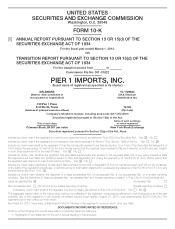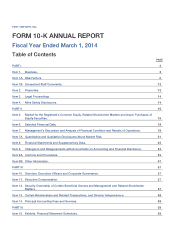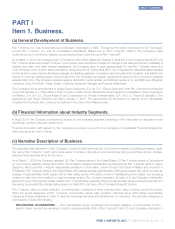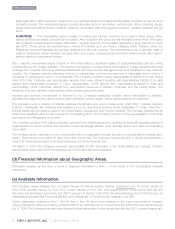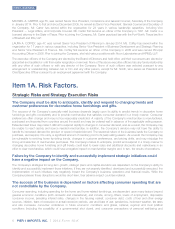Pier 1 2014 Annual Report Download - page 15
Download and view the complete annual report
Please find page 15 of the 2014 Pier 1 annual report below. You can navigate through the pages in the report by either clicking on the pages listed below, or by using the keyword search tool below to find specific information within the annual report.
ITEM 1A. RISK FACTORS.
its numerous locations, large number of employees, contact with consumers and importation and exportation of product. In
addition, the Company is subject to regulations regarding consumer product quality and safety standards. Complying with
regulations may cause the Company to incur significant expenses, including the costs associated with periodic audits. Failure to
comply may also result in additional costs in the form of penalties and fines.
The Company operates in many taxing jurisdictions, including foreign countries. In most of these jurisdictions, the Company is
required to collect state and local sales taxes at the point of sale and remit them to the appropriate taxing authority. The
Company is also subject to income taxes, excise taxes, franchise taxes, payroll taxes and other special taxes. The Company is
also required to maintain various kinds of business and commercial licenses to operate its stores and other facilities. Rates of
taxation are beyond the Company’s control, and increases in such rates or taxation methods and rules could have a negative
impact on the Company’s financial results. Failure to comply with laws concerning the collection and remittance of taxes and with
licensing requirements could also subject the Company to financial penalties and fines or business interruptions.
Risks Associated with International Trade
As an importer and retailer of imported merchandise, the Company is subject to certain
risks that typically do not affect retailers of domestically produced merchandise.
The Company must order merchandise well in advance of delivery and generally takes title to the merchandise at the time it is loaded
for transport to designated U.S. destinations. Global political unrest, war, threats of war, terrorist acts or threats, especially threats to
foreign and U.S. ports and piracy, disruption in the operation of the international portion of the Company’s supply chain, labor unrest or
natural disasters could adversely affect the Company’s ability to import merchandise from certain countries. Although the Company
pays for the vast majority of its merchandise in U.S. dollars, fluctuations in foreign currency exchange rates and the relative value of the
U.S. dollar, restrictions on the convertibility of the dollar and other currencies, duties, preferential trade agreements including general
system of preferences, taxes and other charges on imports, rising labor costs and cost of living in foreign countries, dock strikes,
worker strikes, import quota systems and other restrictions sometimes placed on foreign trade can affect the price, delivery and
availability of imported merchandise as well as exports to the Company’s stores in other countries. The inability to import merchandise
from China and other countries, unavailability of adequate shipping capacity at reasonable rates, or the imposition of significant tariffs
could have a negative effect on the financial results of the Company. Ocean carriage and freight costs contribute a substantial amount
to the cost of imported merchandise. Monitoring of foreign vendors’ compliance with applicable laws and Company standards,
including quality and safety standards and social compliance issues, is more difficult than monitoring of domestic vendors.
Governmental agencies have the authority to enforce trade agreements, resolve trade disputes and control market access to goods
and services. Governments may also impose trade sanctions on foreign countries that are found to violate trade agreements or
maintain laws or practices that are unjustifiable and restrict commerce. In these situations, governments may increase duties on
imports from one or more foreign countries. The Company could be negatively affected by the imposition of trade sanctions.
The governments of the countries in which the Company does business maintain a variety of additional trade laws under which
the Company’s ability to import may be affected from time to time, including antidumping laws, countervailing duty laws,
safeguards laws, and laws designed to protect intellectual property rights. Although the Company may not be directly involved in
a particular trade dispute under any of these laws, its ability to import, or the terms and conditions under which it can continue to
import, may be affected by the outcome of such disputes.
The Company imports merchandise from countries around the world and as a result may be affected from time to time by
antidumping petitions alleging that foreign manufacturers are selling their own products at prices that are less than the prices that
they charge in their home country market or in third country markets or at less than their cost of production. Such petitions, if
successful, could significantly increase import duties on those products. In that event, the Company might decide to pay the
increased duties, thereby reducing gross profits or increasing the price to consumers of the affected products. Alternatively, the
Company might decide to source the product or a similar product from a different country not subject to increased duties or else
discontinue the importation and sale of the product.
Dispute resolution processes in recent years have been utilized to resolve disputes regarding market access between the
European Union, China, the United States and other countries. In some instances, these trade disputes can lead to threats by
countries of sanctions against each other, which can include import prohibitions and increased duty rates on imported items. The
Company considers any agreement that reduces tariff and non-tariff barriers in international trade to be beneficial to its business.
Any type of sanction on imports is likely to increase the Company’s import costs or limit the availability of merchandise purchased
from sanctioned countries. In that case, the Company may be required to seek similar merchandise from other countries on
terms that could be materially less favorable.
PIER 1 IMPORTS, INC. 2014 Form 10-K 11


